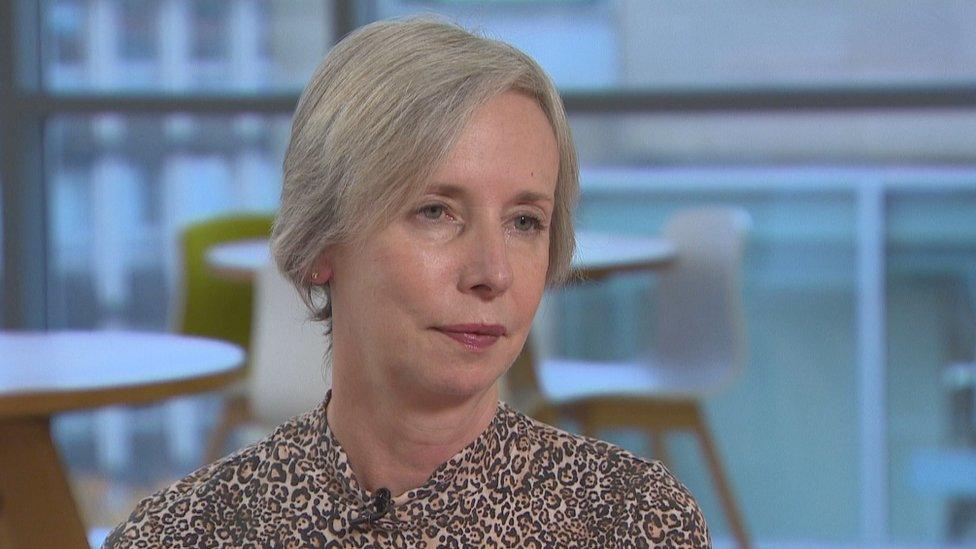Warnings over financial sustainability of NHS Scotland
- Published

Audit Scotland's warnings about the financial sustainability of the NHS in Scotland are regular and loud, but is anyone listening?
The growing share of Holyrood's budget spent on health - heading rapidly towards half - can be seen as a threat to other services, though the health secretary presents it as a sign of the government's commitment
Workforce vacancies are on the rise, but in at least one case, efficiency has been taken to an absurd level, where the most senior official is held accountable by himself
It's become part of the public sector calendar - around this time each year, the auditor general sets off every alarm bell available to her on the subject of the National Health Service.
The reaction; well, it could be worse, it could be like England: patients seem pretty happy though: it'll all work out: the rich just need to pay more tax: at least one target was hit across the country, in that people needing drug and alcohol treatment were all seen within three weeks.
It's worth noting that Caroline Gardner, as auditor general, reports in the most measured and cautious terms. She is only allowed to comment on whether public spending is aligning, and is likely to align, with Scottish government policy.
It's not for her to question whether that policy is right. Nor should it be. But there is some code in there when she calls for changes in the NHS. What's not being said - because she can't say it, perhaps? - is that the government's, and the public's, expectations of the NHS have to change.
Full stretch
Consider this section from her NHS report, where she says that it is essential to understand:
"... how much funding is likely to be required in the medium to long term, and what funding is likely to be available over the same period.
"Where there is a mismatch between what is available and what is required, then options can be developed involving NHS staff, the public and politicians."
She talks also about reform being "incredibly challenging" while the NHS and its staff have to keep running at full stretch.

Auditor General Caroline Gardner said there were questions about the long-term financial sustainability of the NHS
It involves, she says, "significant organisational and cultural change, developing and then introducing new ways of working, and designing, delivering and using new digital technology".
One message is clear here, and reinforced in an interview she did on Radio Scotland: more money is not the solution. It's nice to have, but not sufficient.
And also speaking on Good Morning Scotland, health secretary Jeane Freeman agreed. But there was an interesting divergence in the way they see the NHS budget going.
Caroline Gardner pointed out that it already takes up 42% of Holyrood's budget, and it's on course to get to 50%.
Ms Freeman agrees, and appeared to see that as a good thing.
Political shibboleth
The auditor pointed out that if health takes up more of the budget, then other spending - on education or the economy - gets squeezed.
But the minister portrays the 50% as a target to be achieved, as if it is a symbol of the government's commitment to this political shibboleth.
It might even be that by striving towards it, she is seeking to put pressure on her cabinet colleagues, and particularly Finance Secretary Derek Mackay, to join that venture. Behind the scenes in St Andrew's House, there's a tough public spending battle going on.
There is a debate to be had by public, politicians and medical professionals, said the minister, about whether we are measuring the right things in the NHS. She quickly added that's not a way of underplaying their importance or abandoning them.
That chimes with the Audit Scotland view that the balance of available data is too heavily loaded towards acute care, when data about primary and social care is patchy at best. And what gets counted gets attention and resource.
Skills shortage
Behind the focus of opposition parties, and sometimes the media, on hitting targets or failing to, there are big and less obvious questions about governance of the NHS. This is not the sexy bit of health care, or the one that gets votes, but it matters, because without it, the front end can't operate properly.
Audit Scotland highlights the growing number of layers to the NHS, without any layers being removed. And a regional layer has been promised for years, without any sign of what it will mean.
£13.4bnNHS budget 2018/19
42%of Scottish government's total budget
140,881full-time equivalent staff
£6.9bnstaff costs in 2018/19
£1.8bndrug costs in 2017/18
It looks like a desire to slim down 14 area health boards to three or four, but neither the political will nor the funds to make it happen.
The watchdog has returned to its concerns that NHS boards are struggling to recruit members with the right skills.
And on workforce planning, or the lack of it, they note the vacancies, plus the added pressure from Brexit choking off recruitment of European Union nationals. The number of GP practices reporting at least one vacancy is up from 22% to 24% in 2017. Where they found someone, in more than a quarter of cases, it took more than six months.
The number of consultant roles going unfilled: up from 6.5% in 2013-14 to 7.5% last year. Of them, 60% were unfilled for more than six months.
Watchdog watcher
Some vacancies are deliberately unfilled as a means of saving money. But that is unsustainable and a one-off measure. Last year, £449m was cut from budgets, but half of that was one-off. The easy cuts have been made. Any more paring down is bound to be more painful.
And even at the top, where NHS managers are an easy target for criticism (as if their absence would make things easier for medical staff) the big salaries aren't enough to bring in the right calibre of recruit.
The top job in Greater Glasgow and Clyde required two rounds of recruitment. Several chief executive and finance director roles are being combined - not by design, but necessity.
And by design rather than necessity, the role of the most senior official in the NHS is portrayed by Audit Scotland as some sort of absurdism. The chief executive of NHS Scotland is also the director general of health and social care.
As chief executive since June, Malcolm Wright is accountable for the day-to-day performance of NHS Scotland. And as director-general, he is the person who holds it accountable.
Digest that thought for a moment. And then consider this: the same Malcolm Wright also chairs the assurance committee which has the job of making sure that the accountability role is being properly carried out.
In other words, Mr Wright is not only his own watchdog, but is the watchdog to ensure his scrutiny is up to scratch.
Sounds like he's chasing his tail. Or perhaps it's just barking.
- Published24 October 2019

